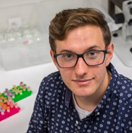Biologist Investigates Antibiotics in Environment
 A Binghamton University student could change how people think about antibiotics and the environment. Matthew Wersebe studies the effect of antibiotics on wetland ecosystems. “I realized no one was really looking at the effects of antibiotics as a contaminant, so that’s where we started,” says Wersebe, a biology major.
A Binghamton University student could change how people think about antibiotics and the environment. Matthew Wersebe studies the effect of antibiotics on wetland ecosystems. “I realized no one was really looking at the effects of antibiotics as a contaminant, so that’s where we started,” says Wersebe, a biology major.
Antibiotics kill or inhibit the growth of microorganisms. Agricultural companies treat animals with antibiotics for a variety of reasons, such as the reduction of pain or suffering, or to ensure their health or survival. Wersebe studies sulfadimethoxine (SDM), an antibiotic used to treat dairy cows, chickens and other animals.
Antibiotics, which are present at low levels in the environment, are considered “practically non-toxic” by the EPA. However, Wersebe found low levels of antibiotics do have an environmental impact. SDM, for instance, had a negative effect on zooplankton, which is an important or “keystone” consumer for the proper functioning of an aquatic ecosystem. Green algae is a main source of energy for zooplankton, whereas blue-green algae (BGA) is toxic or unpalatable to zooplankton. Blue-green algae populations increase in the presence of SDM.
“We should expand the assessment of chemical toxicity to include community interactions, so that we can better determine the impacts of antibiotic pollution on natural systems,” Wersebe says.

According to a report from the Union of Concerned Scientists, U.S. livestock producers use an estimated 24.6 million pounds of antibiotics annually. Considering the variety of antibiotics in use, as well as their varying methods of disrupting the growth of microorganisms, it is important to consider their effect on the environment even at low levels, Wersebe says.
SDM is just one antibiotic chemical used by agricultural companies; there are many more. “That’s what makes the research complicated,” Wersebe says. “Antibiotics are a diverse group of chemicals with different modes of action.”
Wersebe began his research after receiving a 2016 Summer Scholars and Artists grant. He works in the lab of Jessica Hua, an assistant professor of biological sciences at Binghamton.
“One clear example of his leadership is his work with the Friends of Recreation, Conservation and Environmental Stewardship (FORCES),” Hua says. “This organization aims to develop relationships between faculty and students that lead to a mutually beneficial relation with state park units. Matt has been working to develop a FORCES chapter here on campus and has taken the initiative to involve my lab in his efforts.”
While many undergraduates put in a lot of time and effort in the lab, Wersebe extends beyond that and is very independent, says Vanessa Wuerthner, a doctoral student in Hua’s lab. “He spends much of his time in the lab and is continuously coming up with new research ideas that he carries through from start to finish,” she says. “He is currently working closely with another graduate student in the lab to publish his first manuscript.”
Next, Wersebe wants to see how zooplankton affected by antibiotics interact with other chemicals in agricultural runoff, such as insecticides that get sprayed on crops. He wants to know if antibiotics make zooplankton more or less resistant to insecticides, using antibiotics and algae that will be cultured in the lab. Wersebe’s work this summer is funded by the Garden Club of America.
“As consumers, we vote with our dollars,” Wersebe says. “Seeing firsthand how antibiotics have an environmental impact, I’ve become more conscious of what I consume and where it is sourced from. I try to have the smallest impact on the environment.”
- Tags:
- 2016 Summer Scholars and Artists grant
- antibiotics as a contaminant
- Binghamton University
- blue-green algae (BGA)
- chemical toxicity
- Friends of Recreation Conservation and Environmental Stewardship (FORCES)
- Gabrielle M. Ciraco
- Garden Club of America
- Jessica Hua
- Matthew Wersebe
- sulfadimethoxine (SDM)
- U.S. Environmental Protection Agency (EPA)
- U.S. livestock
- Union of Concerned Scientists
- Vanessa Wuerthner
- wetland ecosystems
- zooplankton
- Login to post comments